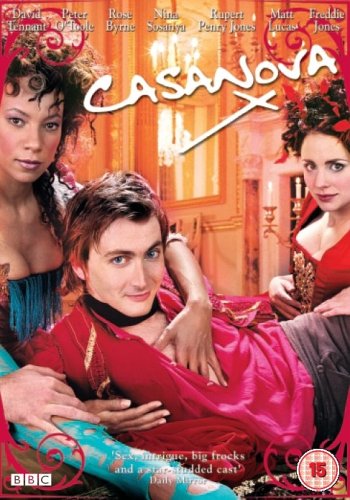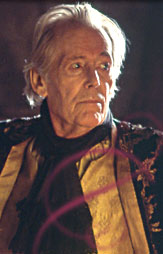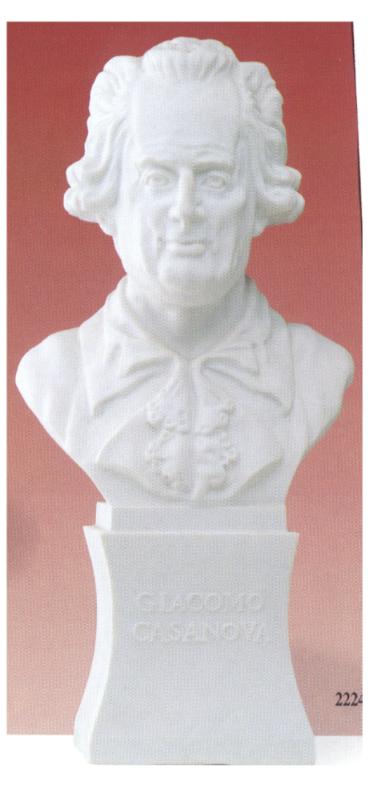 | Casanova, 2006, BBS Masterpiece theatre |
|
|
|
Philosophical film about SEX and LOVE
But frames - fantastic!!!
BBC Wales
http://www.movies.org.ru/forum/index.php?act=Print&client=printer&f=33&t=1328
Rising from his ignominious birth, Giacomo Casanova transforms himself into a witly, intelligentgone wild.In between romantic assignations, Casanovameets the love of his life, the charming Henriette, but she has already made a financially advantageous engagement to the wealthy Count Gramani and Casanova is heardbroken. When Grimani has Casanova arrested for crimes both real and imagined, Casanova makes a daring escape from prison, cutting a swathe through the capitals of Europe as he seduces the women (and men) in his path and reinvents himself as a doctor, a lawer, an astrologer, and even a fake noblemen.
History of My Life chronicles an action-packed lifetime of sublime sexual conquests, lightly glued together with contemporary anecdote, social vignettes and local color. Its language is a triumph of richly crafted French prose (we know its author worked and reworked his narrative), which was first rendered into excellently apt English by Willard Trask in the 1960s. It is vital, sharp, racy but mercifully discreet -- no Anglo-Saxon four-letter words but only "conquests," "combats, "pleasures" and "crimes" committed in the name of "love." The pace never flags -- for all of the customary repetitiveness of Casanova''s sexual exploits, this is a grippingly good read.
Who was Casanova?
Was Giacomo Girolama Casanova the world''s greatest lover? A egocentric womanizer? Or an enlightened renaissance man? His fascinating and complex life holds no clear answers.
He pursued several careers during his lifetime, including priest, soldier, violinist, spy, entrepreneur, businessman, Homeric translator, novelist, and librarian. His (by his own count, 122) sexual conquests included one of his own (illegitimate) daughters. He traveled extensively throughout Europe -- at times by choice, occasionally by necessity -- in search of women, employment, stature, and in flight from the law. And he died, lonely and poor, in a castle in Bohemia.
Casanova was born in Venice on April 2, 1725. His parents were actors - a lowly profession -- who were frequently not around; he was raised primarily by his maternal grandmother. A weak child, he endured chronic nosebleeds, a misery he later said was healed by magic.
When Casanova was eight his father Gaetano died, leaving his mother a widow at 25. The following year, in 1734, he was sent to Padua to study with a Dr. Gozzi. Gozzi''s younger sister Bettina became his first love.
Casanova turned out to have a robust intellect; although he lived primarily in Venice, he continued his education at the University of Padua. At the age of 17 he received a degree in civil and canon law and decided to pursue a career in the church. He was assigned a place at the seminary at San Cipriano, but was promptly expelled. He became an assistant to Giacomo da Riva, the "governor of the galleys" in Corfu, but left by March of 1743.
Casanova found himself in the right place at the right time; fortuitously, he saved the life of Matteo Bragadin, one of the richest and most powerful men in Venice. The indebted Bragadin embraced Casanova -- and gave him housing, his own gondola and a steady income. In Venice, Casanova met and fell in love with the supposed castrato soprano Bellino. But ultimately, he rejected the affiliation.
In 1749, at Cesena in northern Italy, Casanova met the lovely and enigmatic French adventuress, Henriette. He was mesmerized: "People who believe that a woman is not enough to make a man equally happy all the twenty-four hours of a day have never known a Henriette," he would write. When she left him he was inspired to compare love to an incurable illness and a divine monster.
in 1755 Casanova was incarcerated for depravity and blasphemy. Although no prisoner had ever before escaped from the infamous Leads Prison in the Doge''s Palace in Venice, after serving little more than a year of a five-year sentence, the resourceful Italian became the first to do so. He fled to Paris, participated in the creation of the French state lottery and found himself, once again, wealthy and f��ted.
In 1761, in Naples, Casanova proposed marriage to the seventeen-year-old mistress of the impotent Duke of Matalone. But Casanova would discover that his beloved''s mother was Donna Lucrezia, with whom he had had an affair in 1744. Leonilda was actually his daughter. Characteristically, though he stopped short of marriage, he does still manage to bed both mother and daughter.
Casanova continued to travel throughout Europe. He worked on various literary projects and explored politics. He did some spying on the confidential activities of the populace for the Venetian Inquisition. In 1765 he visited Moscow and met Catherine the Great. In Warsaw he attracted the interest of King Stanislas Poniatowski, but his involvement in a duel (over an actress) forced him to leave the country.
By 1785 he finally and reluctantly settled in Dux, Bohemia (now the Czech Republic), where he worked as a librarian for the wealthy Count Josef Karl Emmanuel von Waldstein. Impoverished but inspired, he set about writing his now famous, 12-volume memoir, History of My Life. It would not be published in full until 1966.
In April of 1798 he fell ill with a urinary tract infection and died the following June. What was described by biographer Lydia Flem as the "perpetual carnival of his life,'''' had at last come to an end.
The movie, which premieres tomorrow night at 9 on Channel 2, offers us a sweet surprise by giving us the world-famous 18th-century slut as a man in love with the unattainable Henriette (Laura Fraser). This time around, the young Casanova (David Tennant) would gladly give up his sexual high jinks to marry this elegant woman, who wears red while the other court ladies dress in pale tones. But, having come from nothing herself, Henriette won''t throw in her lot with a penniless drifter whose fortunes change like the weather. Casanova must brood.
This is a counter intuitive approach to the story of hedonism and frolic that has been told so many times on screen, and writer Russell T. Davies deserves credit for his reinvention. Davies, who also wrote the British version of ``Queer as Folk," maintains the farcical tone that you''d expect from any ``Casanova." He and director Sheree Folkson energize Casanova''s heyday with a cleverly self-conscious style that mixes contemporary dance, modern language, and camera trickery with glorious 18th-century visuals. But then the filmmakers play down what we already know about Casanova''s love-making prowess, in order to accommodate nice touches of bittersweet romantic melodrama.
Alas, like so many lives on film, ``Casanova" is mostly a flashback, framed by the story of the older hero looking back . Played by Peter O''Toole, the latter-day Casanova has aged into a librarian in a musty castle , and he has no joy except to write down his early adventures. When an adoring maid (Rose Byrne) asks him about his past, he is all too glad to revisit it -- while putting the moves on her .
The problem is, O''Toole''s Casanova seems completely disconnected from Tennant''s Casanova. As the movie hops back and forth between the two actors, continuity feels strained. O''Toole portrays a lugubrious egomaniac, without the charms of a man who knew how to listen to women and make them feel loved. But Tennant plays a cheeky and slightly geeky dude who doesn''t let his ego get in the way of his conquests. Unloved by his mother as a child, he finds something deep in the arms of women. O''Toole''s Casanova seems cowardly and vain; Tennant''s Casanova is lovable and, at certain moments, noble.
And O''Toole gives an inflated performance that works hard to be great, and not necessarily good. With his hammy expressiveness, he''s straining to be larger than life, and more tragic than the movie merits. To me, his acting seemed indulgent, particularly in the second half of the movie (next Sunday) . ``Casanova" is a giddily unconventional tale of an adventurous youth, but then it''s also a stock and inflated portrait of old age. It''s only half good - http://www.boston.com/ae/tv/articles/2006/10/07/clever_but_flawed_casanova_will_woo_some_viewers/
Russian descript: http://www.movies.org.ru/forum/index.php?act=Print&client=printer&f=33&t=1328
Television: Masterpiece theatre
Casanova on films
Masterpiece discussion
WIKI: Masterpiece theatre
IMBD


